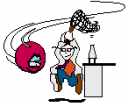BioMom's Warning:
This is one subject that I find I must editorialize
quite a bit. I am too frustrated with what I've seen on this topic.
Whether or not certain Genetically Engineered (GE)/Genetically modified (GM) foods are potentially harmful, the propaganda war seems to have been won by fear.
There is LOTS of propaganda on both sides.
WHAT?DNA is like string.
You can cut it up and fuse it back together. There are huge long strings of
DNA (like chromosomes) and little tiny circles of DNA. Bacteria are particularly
good at trading little bits of DNA back and forth amongst each other. Viruses
are little bits of DNA that invade our cells (and sometimes insert into our
DNA!). Genetic engineering is the process of introducing a little piece of DNA
(with certain genes on it, like a gene that will make a plant resistant to insects)
into the DNA of a plant or animal. This is done very routinely with bacteria,
but with plants and animals it is much more difficult to achieve. While manipulating
the genetic makeup of plants and animals seems like a modern idea, human beings
have been doing selective breeding and pollinating of animals and plants for
centuries.
What will this DNA do to us if we eat it? 
If I eat corn, will I turn into a corn plant? No. If I eat a lot of lettuce, will I turn green? No. We ingest
mindboggling amounts of "foreign" DNA into our bodies CONSTANTLY: We are constantly breathing in viruses & bacteria. We eat plants, and some of us eat animal meat.
Sure, it is important to test any genetically modified organism (like any new food) as being safe for consumption. But I think there is a lot of unnecessary fear in this regard.
What will this DNA do to the plant or animal we are genetically modifying? 
Any first year biology student can tell you that putting "foreign" genes in an organism does not necessarily mean you are creating Frankenstein's monster. If you make too
drastic of a change to an organism's DNA you usually kill it or render it infertile, not turn it into some super beast. Nature has wonderful ways of protecting itself.
And scientists have wonderful ways of answering this question.
What is natural, by the way?
Antibiotics are naturally found in the environment yet they are not considered to be a natural, homeopathic treatment. Bananas are considered
natural, but if you eat too many of them at once it can kill you (high potassium content in certain foods are dangerous for people with heart problems). An extreme example, but you get the point.
Portraying GE as something "unnatural" is vague and misleading. Is heating up food in a microwave "natural"? Is flying in an airplane "natural"? I think we are better off asking what is HARMFUL. I know pesticides are
harmful, which is why I try to get organic produce for my daughter (and for us!) but I don't realistically always have this option.
WHERE? to get more information....
FDA Biotech
info page
GE fish
GE and
allergies
WHY? ETHICS. Why are we genetically
modifying certain foods? Sometimes we think that with all the knowledge
we have that wisdom comes along with it. In order to convince
me (and probably most people) that GE of an organism is important, the benefits
have to outweigh potential, unknown risks. I'd rather feed my daughter a vegetable
that contains a miniscule amount of insecticide produced by genetic engineering,
than feed her one that has been doused for weeks, perhaps throughout its entire
growth period, with pesticide. Washing does not necessarily get rid of all of
the chemicals either. I don't agree with engineering plants to be more resistant
to herbicides, so we can then pollute our food, ground and water with even more
of these chemicals. I also think it is a mistake to pump cows full of hormones
(doesn't matter if they are genetically modified OR natural hormones!) so we
can push their bodies to extremes and make more money in the process.
WHO? I've been debating this
with my husband. After the recent corrupt behavior of several big US companies,
he has very little faith in the honesty of big business, pharmaceutical companies
included. I argue that, sure, companies want to make money. In a capitalist
society, they HAVE to make money. I also argue that making an unsafe product
that will eventually lead to thousands of law suits and the destruction of consumer
confidence will not.
In my research on this subject, I purposefully ignored all websites by pharmaceutical companies. I don't
need them to tell me what genetic engineering is, I used to do it almost every day in my research on infectious disease.
What shocked me was the number of websites totally against GE, including the World Wildlife Fund and Greenpeace. I usually am a big fan of their conservation and environmental efforts.
"Don't they have geneticists or molecular biologists who are a part of their organizations?" I ask myself. "What exactly are they afraid of?" I'm still looking for the
answers to these questions.
Greenpeace claims GE is an "inherently risky" process then don't explain what they mean by that. In the city where I live approx. 200 people/year are killed by cars
while crossing the street. You could say that leaving the house is an "inherently risky" process. Does that mean I shouldn't do it?
They state that the effects of GE are unknown, and then refer to it as pollution? I am disappointed with the propaganda on their websites, including images of
grenades shaped like an ear of corn or the use of words like "Frankenfries." Are they TRYING to lose my respect? Or just scare people into blindly
accepting what they say?
A few more
important issues
There is no long term data on the health effects of GE. --Did we have that for microwave oven use? Pesticide use? Antibiotic use? Pasteurization?
There was a first heart transplant recipient, a first bone marrow transplant recipient! How are we supposed to get this long term data if we can't even consider
the current data rationally?
What is the effect of releasing GM products into the environment? --I'm no ecologist, but this seems a legitimate and important concern.
And I believe we should be reasonably cautious in this regard.
Once again to put things into perspective: International travel and importing of animals from one region to another has upset flora and fauna
since even before the time of Christopher Columbus. There are many disasterous examples of this (for instance, snakes "hitchhiking" on airplanes have been introduced
onto the island of Guam and have killed almost all the indigenous birds, as well as injurying a few infants.)
Every time we board a plane we could easily be carrying pollen, seeds or insects from one continent to another that could upset the balance of nature there.
There are
many studies currently underway to answer this question...I'll try to post more info on this soon....
Labelling products as being genetically modified. --Proper labelling is very important, but not just for knowing about GE. The problem is that most people don't
read what is in their food right now. Preservatives, additives, food coloring�.much of which is not "natural." Were the "long term effects" measured before they were added to our food?
Maybe we should be more vigilant, in general, when it comes to what we eat.
Some genetically modified plants may be safe to eat...others may not be. Some
people may be more sensitive to certain GM foods...others may not be. Certain
types of genetic changes may be safe and useful...others may not be. If we can
understand the basic principles of GE, try to stay open-minded, and try to keep
informed on the issue then we can make educated decisions that improve our quality
of life.

